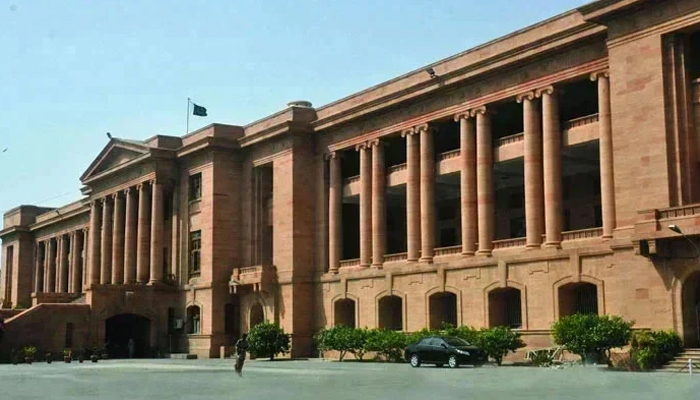SHC calls reports on subsoil water extraction policy
The Sindh High Court (SHC) issued notices to mineral water companies, irrigation department, federal ministry of commerce and production, and others and directed them to submit a report in respect of the government’s policy on issuance of subsoil water extraction permission and criteria for extracting the subsoil water.
The direction came on a petition filed by a private water distribution company challenging the Karachi Water and Sewerage Corporation (KWSC) Act’s regulations with regard to imposing water extraction charges and grant of permission.
A counsel for the petitioner submitted that Bin Qasim Town granted no objection to the petitioner for extraction of subsoil water in its jurisdiction while the KWSC had no jurisdiction to grant permission and impose charges on extraction of subsoil water.
He submitted that the KWSC intended to impose a fee for extraction of subsoil water despite payment of the water connection fee. The counsel submitted that the water corporation could not impose fee on the extraction and only the Sindh government, even not the federation, was the competent authority to levy such a fee.
A division bench of the SHC headed by Justice Salahuddin Panhwar observed that the high court acknowledged the fact that Karachi was part of the Indus Delta and recognised feasibility of mineral water companies to source water from upper stream of river such as Indus at Skardu provided that they were granted necessary permissions from relevant authorities.
The high court observed that the Constitution of Pakistan did not explicitly recognise right of water as fundamental right however this right is implied within the broader fundamental rights enshrined in the Constitution, particularly the right to life in the Article 9 and right to dignity of man in Article 14 of the Constitution.
The high court observed that the Supreme Court had interpreted these constitutional provisions to include right to access to clean and safe drinking water as an integral component of the right of life and human dignity.
The SHC observed that the judicial interpretation had strengthened the legal framework for the protection of the right to water in Pakistan even in the absence of its explicit recognition in the Constitutional text.
The high court observed that the challenge however remained in the effective implementation of this right through appropriate legislation, and regulatory and enforcement mechanism.
The bench issued notices to the KWSC, mineral water companies, irrigation department, Pakistan Standard and Quality Control Authority (PSQCA), Pakistan Council of Research in Water Resources (PSCWR), and federal ministry of commerce and production to file reports with regard to the government policy on issuance of subsoil water extraction and the criteria for extracting subsoil water.
The SHC observed that it was imperative that all mineral water companies in Pakistan adopted a transparent and rigorous approach to their water treatment process. The high court observed that these companies must provide a detailed and comprehensive mechanism of their water purification and bottling method which should include information about the sources of water, filtration process and any additional treatment or additions used to ensure water purity.
The bench observed that these detailed mechanism should not merely be a procedural formality but must be thoroughly examined and verified by the relevant government departments and independent laboratories.
The SHC observed that the PSQCA and PCRWR should play a vital role in the verification process ensuring that the water met both national and international standards for safety and quality.
The bench observed that only through such comprehensive steps can could ensure that bottled water available in the market was genuinely safe, clean and beneficial for the well-being of its consumers.
-
 Dwayne Johnson Confesses What Secretly Scares Him More Than Fame
Dwayne Johnson Confesses What Secretly Scares Him More Than Fame -
 Elizabeth Hurley's Son Damian Breaks Silence On Mom’s Romance With Billy Ray Cyrus
Elizabeth Hurley's Son Damian Breaks Silence On Mom’s Romance With Billy Ray Cyrus -
 Shamed Andrew Should Be Happy ‘he Is Only In For Sharing Information’
Shamed Andrew Should Be Happy ‘he Is Only In For Sharing Information’ -
 Apple Sued Over 'child Sexual Abuse' Material Stored Or Shared On ICloud
Apple Sued Over 'child Sexual Abuse' Material Stored Or Shared On ICloud -
 Nancy Guthrie Kidnapped With 'blessings' Of Drug Cartels
Nancy Guthrie Kidnapped With 'blessings' Of Drug Cartels -
 Hailey Bieber Reveals Justin Bieber's Hit Song Baby Jack Is Already Singing
Hailey Bieber Reveals Justin Bieber's Hit Song Baby Jack Is Already Singing -
 Emily Ratajkowski Appears To Confirm Romance With Dua Lipa's Ex Romain Gavras
Emily Ratajkowski Appears To Confirm Romance With Dua Lipa's Ex Romain Gavras -
 Leighton Meester Breaks Silence On Viral Ariana Grande Interaction On Critics Choice Awards
Leighton Meester Breaks Silence On Viral Ariana Grande Interaction On Critics Choice Awards -
 Heavy Snowfall Disrupts Operations At Germany's Largest Airport
Heavy Snowfall Disrupts Operations At Germany's Largest Airport -
 Andrew Mountbatten Windsor Released Hours After Police Arrest
Andrew Mountbatten Windsor Released Hours After Police Arrest -
 Heidi Klum Eyes Spooky Season Anthem With Diplo After Being Dubbed 'Queen Of Halloween'
Heidi Klum Eyes Spooky Season Anthem With Diplo After Being Dubbed 'Queen Of Halloween' -
 King Charles Is In ‘unchartered Waters’ As Andrew Takes Family Down
King Charles Is In ‘unchartered Waters’ As Andrew Takes Family Down -
 Why Prince Harry, Meghan 'immensely' Feel 'relieved' Amid Andrew's Arrest?
Why Prince Harry, Meghan 'immensely' Feel 'relieved' Amid Andrew's Arrest? -
 Jennifer Aniston’s Boyfriend Jim Curtis Hints At Tensions At Home, Reveals Rules To Survive Fights
Jennifer Aniston’s Boyfriend Jim Curtis Hints At Tensions At Home, Reveals Rules To Survive Fights -
 Shamed Andrew ‘dismissive’ Act Towards Royal Butler Exposed
Shamed Andrew ‘dismissive’ Act Towards Royal Butler Exposed -
 Hailey Bieber Shares How She Protects Her Mental Health While Facing Endless Criticism
Hailey Bieber Shares How She Protects Her Mental Health While Facing Endless Criticism




